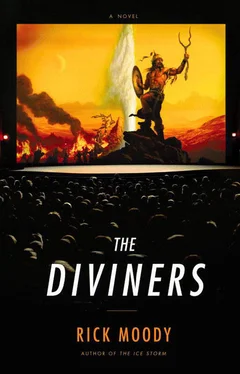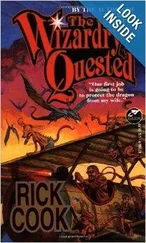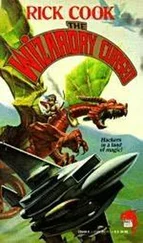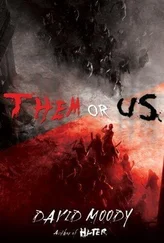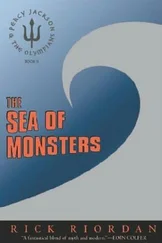Good thing they paid up front, because one question Vanessa asks herself is whether the story is worth fifty dollars. The whole way back to town, while Bo chatters on about other sightings, she’s thinking about Brenda Mae, who he says works at a hotel in the next town, as a waitress. Is the story worth fifty dollars? Did Brenda Mae Millerton go to the psychiatrist after her experience? Did she go to the church of her choice? Did the evangelical church help her with the feeling that she’d been abducted and probed by the visitors? Would the Seventh-Day Adventists or the Jehovah’s Witnesses welcome such a parishioner?
Bo says, “All of these persons I’m telling you about were administered lie-detector tests by the sheriff of Alpine, who considers himself an expert on alien encounters. Brenda Mae passed the lie-detecting test with flying colors, indicating that she believes without reservation that the events took place as I’m describing them. She was also hypnotized, by a fortune-teller from Midland, and the fortune-teller believes the story, too. In fact, this oracle actually hinted at some of the experiments that might have been performed on Brenda Mae, tests that probed the cellular dimension of human tissue, things of that nature. The last thing I’ll say, before I conclude for tonight, is that Brenda Mae reports that in the weeks after her abduction she was suffused with warm feelings for humanity, feelings of love. She believes that the lesson being imparted by the visitors was the lesson of love. She believes that she was being probed so that the visitors could try to understand why there was so much hatred here on Earth. Brenda Mae wishes she could travel back up into the craft now because of that sweet feeling of union.”
Back at the hotel room, Vanessa’s mother’s voice beckons to her from the complexity of silences, her mother’s unearthly voice, reached by remote, on Vanessa’s machine back in Brooklyn: “Don’t want you to worry. . in Florida, honey. . don’t want you to. . now, I want you to promise that. . everything. . got an important. . taking marching orders from an important. . nothing to. . people making the decisions. . in close contact. . calling me and. . front of the courthouse. . because there’s just. . hang on, just a, I’ve got to. . who would have thought. . old mother. . weather is. . only just a couple of weeks. . young men in suits. . people have to stand up. . proud. . moments like this. . in case you have forgotten. . just as soon that I. . not thinking too clearly. . really ought to give it some more thought. . got a swimming pool. . a long bus ride. . very nice man came today. . the justices are. . the ruling is. . that woman is. . my stomach is. . don’t worry about a. . back before you. . on the next bus and. .”
The part that gives Vanessa the creeps is not the slurred speech on the message, the marginal clarity, but the fact that the call seems as if it’s all part of the same evening’s entertainment. The call should be reassuring, because at least her mother is still her mother, doing the things that her mother seems to do, but of course there is no number where she might return the call, and she can’t shake the feeling that her mother is one of the visitors.
Vanessa wants to go to Allison’s room. She wants to knock on Allison’s door, and she wants to be admitted to Allison’s room, and she wants to wrap herself in Allison’s arms, and she wants to tell Allison what’s going on. She wants to have one of those heart-to-heart conversations that other people seem to get to have, especially after they have slept together.
But next morning Vanessa’s all business. If life is love and work, and the love machinery has blown an important fuse, well, at least you still have work. So in the morning, all Vanessa can talk about is the border, how they need to get closer to it. The Chisos Mountains, for example, she has the map to indicate the mountains, the Rio Grande, the thousand species of cacti, the geological layers. Allison has barely finished her coffee and huevos rancheros before they’re driving south, into a landscape so flat that it’s easy to see why Bo Fontaine’s visitors would have landed. Mountains hover in the distance, bisected by clouds and heat mirages. Vanessa gets the rental car up near a hundred miles an hour, since there are no other cars, until the Grand Am rattles as if it’s going to break apart from the g-forces of her fanaticism.
Past the entrance to the national park, of course, because it will be full of college students on Thanksgiving break. Nothing ruins the feeling of adventure like kids sporting hemp products. She turns right just beyond the park entrance. And the next town on the road that shadows the river is:
“Terlingua Ghost Town,” Allison says, reading aloud. “Blah blah blah, mining company once employed thousands of workers, vanished as quickly as it was established. Countercultural types in residence, blah blah.”
“What could be better?”
“On the other side of town is the new state park. Four-wheel drive only.”
They stop for gas in Terlingua, and the first local they observe is in his fifties with a ponytail tickling his lumbar region, riding a bicycle with a Chihuahua in the front basket. The guy looks as if he might be carrying gas back to a jalopy that ran dry somewhere on the roads out of town. Or maybe he needs to restart his tractor, so that he might harvest some righteous bud, completely organic. They disappear into the low mesas, where the road threads through the abandoned mines, the quicksilver mines of Terlingua’s former glory.
Beyond, the road is rutted and pitted to such a degree that the Grand Am must slow to a proverbial crawl. To the right of them, the state park rises unvisited. To the left is the river and, therefore, the border. Between the two, the dirt road on which they travel. A bird twitters somewhere and falls silent. A breeze whispers.
They get out of the car.
The two women pry apart the barbs of the fence and they trespass onto the state land, because Vanessa wants to be on the top of the hill about a mile distant, because she wants to see all the way into the interior across the muddy river. Vanessa won’t hear a word about snakes. She threads her way around the prickly pear and agave and starts toward the hill. This is what John Ford saw, this is what Edna Ferber saw, when they looked over to the other side. The border across which all is uncertainty, radical factions, kidnapping, persecution of the natives, executions by the police, disappearances, diviners, sorcerers, visionaries, penitents, this is what they saw when looking out from here.
It’s Allison who breaks the silence.
“So who came up with the idea, anyway?”
Vanessa’s already sweating horribly. She keeps dabbing at her forehead with the sleeve of her sweatshirt. “We should have brought water.”
“I mean, who really came up with the miniseries? If everybody has a different version of the story —”
“It was just some piece of coverage that Annabel had. I don’t know. Some novel.”
“I kept trying to, you know, find the original manuscript, but every manuscript that I found that was supposedly the manuscript, it turned out it wasn’t anything like the coverage, the stories were completely different.”
“Melody Forvath? Or whatever her name was?”
“I don’t think Melody Forvath wrote anything about dowsers. She’s friends with my mom, you know.”
“Your mom is friends with her? We could have saved money! You could have said it was a film school project or something!”
The river and its flagstone bottom begins to come into view, winding away like a lasso. Beyond, the neighbor to the south.
“I don’t think there is a book,” Allison declares.
Читать дальше
